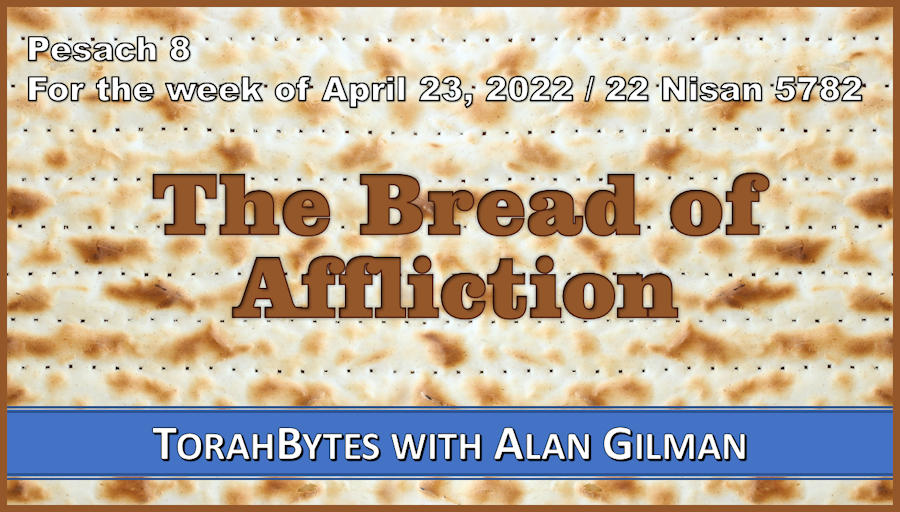For the week of April 23, 2022 / 22 Nisan 5782

Pesach 8
Torah: D’varim/Deuteronomy 14:22 – 16:17; B’midbar/Numbers 28:19-25
Haftarah: Isaiah 10:32 – 12:6
Originally posted the week of April 11, 2015 / 22 Nisan 5775 (updated)
Download Audio [Right click link to download]
You shall eat no leavened bread with it. Seven days you shall eat it with unleavened bread (matzah), the bread of affliction – for you came out of the land of Egypt in haste – that all the days of your life you may remember the day when you came out of the land of Egypt. (D’varim/Deuteronomy 16:3)
Before I get into this week’s message, I want to explain why we have, both last week and this, special Torah readings for Pesach (English: Passover). In the Torah, Pesach is a seven-day festival. Both the first day and the seventh day are to be treated as especially holy, as sabbaths. Due to how the calendar was set by the religious authorities in ancient times, all such special sabbaths, except for Yom Kippur (English: the Day of Atonement), are to be observed over a two-day period outside the land of Israel. Despite modern improvements in precision, this tradition continues till now. Therefore, outside the land of Israel, Pesach lasts eight days. When certain festivals, such as Pesach, fall on a weekly Shabbat, the normal parsha (Torah reading portion), is postponed. This year, since the holiday began on Shabbat, the last day is also Shabbat. Thus, postponing the normal weekly reading two weeks. In Israel, however, the normal weekly reading resumes, since Pesach is only seven days long there. This means the weekly reading will be out of synch, and will continue to be so until the last Shabbat in July when two weeks’ worth of reading will be covered outside Israel.
Since I currently live outside of Israel, I now present to you another special Pesach message.
If you have ever attended a Seder you most likely heard the following words when the matzah (English: unleavened bread) was uncovered near the beginning of the evening: “This is the bread of affliction that our forefathers ate in the land of Egypt.” But perhaps you didn’t know that calling the matzah “the bread of affliction” is taken directly from the Torah.
The Hebrew word for “affliction” is “a-nee’,” and refers to being in an oppressive state, such as hardship or poverty. Matzah as a key symbol of Pesach would always serve as a reminder of the great suffering in Egypt with or without referring to it as the bread of affliction. But the verse I quoted at the beginning makes it sound as if the matzah is not a reminder of the slavery experience but of freedom: “eat it with matzah, the bread of affliction – for you came out of the land of Egypt in haste – that all the days of your life you may remember the day when you came out of the land of Egypt.”
Indeed it was the rush to leave Egypt following the tenth and final plague that is the reason for the eating of matzah. We read:
The Egyptians were urgent with the people to send them out of the land in haste. For they said, “We shall all be dead.” So the people took their dough before it was leavened, their kneading bowls being bound up in their cloaks on their shoulders (Shemot/Exodus 12:33-34).
So if the matzah is connected with leaving Egypt, why is it not called “the bread of deliverance?” The answer is found a few verses later. Regarding the preparation of the unleavened dough they took with them, we read:
And they baked unleavened cakes of the dough that they had brought out of Egypt, for it was not leavened, because they were thrust out of Egypt and could not wait, nor had they prepared any provisions for themselves (Shemot/Exodus 12:39).
Even though the exodus from Egypt was a momentous liberating event, in its own way it too was a hardship. Anyone who has been released from long-term personal or corporate abuse knows how difficult such transitions can be. Free from slavery, yes, but Israel had to endure a harsh, unknown wilderness with little to no prepared provision. This resulted in all sorts of next-to-impossible challenges to the point that some would eventually pine after their former slavery. Unless they learned to depend on God, they wouldn’t make it. And many didn’t. Almost the entire adult generation that left Egypt were kept from entering the Promised Land due to their unfaithfulness to God (see B’midbar/Numbers 13 – 14).
After the initial euphoria of newfound freedom subsides, the harsh realities of strange and perhaps hostile environments, a lack of familiar social structures and personal and communal resources must be faced with tenacity and hope for a better future. Whether it be an immigrant from a worn-torn land or someone newly distanced from an abusive situation, denying the reality of the new challenges faced by freedom can create unnecessary obstacles to the benefits of freedom.
The matzah does more than simply remind us of the hardship of liberation, however. It is assures us that the God who frees us will give us all we need to face the challenges of newfound freedom. It’s not always easy to walk in freedom, but he who rescues us from bondage, will also equip us to live free.
Scriptures taken from the English Standard Version